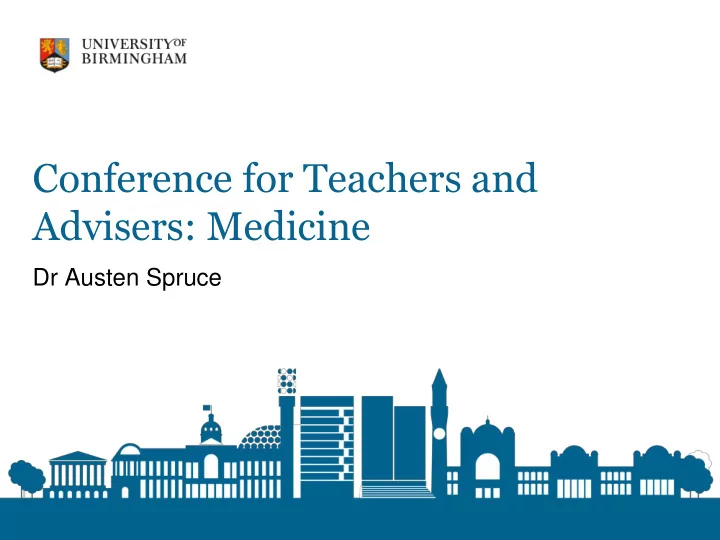

Conference for Teachers and Advisers: Medicine Dr Austen Spruce
What Makes a Good Doctor? www.medschools.ac.uk - Resources for students and teachers Motivation to study medicine and genuine interest in the medical profession Insight into your own strengths and weaknesses The ability to reflect on your own work Personal organisation Academic ability Problem solving Ability to deal with uncertainty Risk management and an ability to deal effectively with problems Honesty Ability to take responsibility for your own actions Conscientiousness Insight into your own health Effective communication, including reading, writing, listening and speaking Teamwork Ability to treat people with respect Resilience and the ability to deal with difficult situations Empathy and the ability to care for others.
Studying Medicine Two different degree programmes – 5-year 360 places; 2500 applicants; 1250 interviews – Graduate entry (4-year) Life science degree 40 places; 800 applicants; 100 interviews
MBChB Curriculum Phase 4: Managing the patient, Year 5 sick and well Phase 3: Broadening the Year 4 professional base Phase 2: Acquiring & utilising Year 3 clinical information Year 2 Phase 1: Building, synthesising and applying the medical Year 1 knowledge base
What is special about Birmingham? Be exposed to, and Undertake outstanding inspired by advances in community based research learning Excellence in Exposure to world prescribing skills class clinical facilities training
5-Year: Selection for Interview Applications are scored ( website ), based on: o Academic (GCSE) results (70%) o Overall UKCAT score (30%) Personal statement: Not scored or used for selection : o Evidence of commitment to medicine o Evidence of involvement in society Reference – Confirmation of aptitude; identification of concerns or extenuating circumstances School contextual information
5-Year: Academic Requirements AS-levels – not used. A2-levels: o Predictions: AAA o Standard offer: A*AA (including Chemistry and Biology) – three subjects in Year 13 o A* in any subject International Baccalaureate o 32 pts in total o 766 at Higher Level, including, Biology and Chemistry
5-Year: UKCAT UKCAT scoring: o No threshold requirement o Total UKCAT scores (excl. SJT band score) of applicants segregated into deciles o Top 10% will receive our maximum score o Expect that each component of UKCAT will have equal weighting o Band score for Situational Judgment Test will be considered at the interview stage for applicants with threshold interview scores
Guidance on Application Score Website has on-line calculator to allow someone to receive an estimate of the score they will receive It is not possible to predict the threshold score for a future cycle Data from the previous admissions cycles suggests that an application score of at least 7.5 (out of 10) must be achieved
5-Year: Widening Participation School contextual data Used to identify fixed proportion (c.20%) of interviewees o Where GCSE school performance meets threshold o Attainment 8:- ≤ 55 (probably) o Threshold application score will be lower (by at least one point – i.e. 6.5, we estimate) If the school contextual data also meets the A Level threshold (≤ 35 pts per A Level entry), the offer is AAA
Work experience and Interviews
Development of Personal Qualities Commitment to a “public servant” role o Health care experience: Active (advised); Long-term o Paid work Extracurricular activities o Significant roles with responsibility Investigate medical practice in the UK o Health stories in the news media
Relevant Experience Evidence of commitment to a “public servant” role o Health care experience (recent; on-going) – amount must be specified o Caring for vulnerable people (not family) o Direct clinical observation not required o Paid work also relevant Extracurricular activities o Responsible roles involving significant interactions on a routine basis Investigate medical practice in the UK (media)
Preparation – For the Interview See guidance on Medical Schools Council website o https://www.medschools.ac.uk/ Develop understanding from experiences and reading o What is inspiring, interesting, disturbing, challenging? Why? o What facilitates/impairs good healthcare? o Reflect (critically) on your own abilities o Form your own opinions (don’t be dogmatic!) Mock interviews – friends, family, teachers o Ensure that your views are challenged
The Interview Multiple Mini-Interviews: 7 x 1-to-1 discussions (6 min each) Format (typical) o Hypothetical situation (described or role play) o Asked to describe past behaviour in certain situations Assessed Characteristics, including: o Communication o Commitment to healthcare practice o Empathy/Perspective taking o Resilience and honesty o Rational decision making
Decisions Interviews held from late November – end February Pre-Xmas interviews: Early communication of decisions to those with interview scores at high and low ends of distribution Candidates with mid-range scores will be held in reserve until after completion of all interviews
Medicine websites 5-year programme: www.birmingham.ac.uk/medicine Graduate entry programme: ww.birmingham.ac.uk/graduatemedicine Email: MDS-MedAdmissions@contacts.bham.ac.uk
Recommend
More recommend